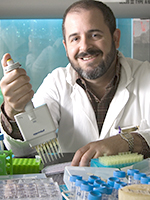
Clinical trials seek to prevent and treat infectious diarrhea.
Clostridium difficile, or C. difficile, is a bacteria that can cause infection when the balance of normal bacteria in the digestive system is upset. Approximately 5% of the population may carry C. difficile without any health problems1. But for others, carrying it can damage the bowel, lead to diarrhea and dehydration, and in extreme cases cause life-threatening complications.
C. difficile causes the most frequent type of infectious diarrhea in Canadian hospitals and long-term care settings2. Vancouver Coastal Health Research Institute researcher Dr. Theodore Steiner has been studying C. difficile since 1995, and while his early work explored how it interacts with the gut, his recent work and involvement in clinical trials investigates how to treat it.

According to Dr. Steiner, C. difficile is almost always triggered by antibiotics, and often appears in people taking those considered “broad spectrum.” Though generally safe and effective in treating infectious diseases, antibiotics can decrease the number of healthy bacteria in the gut and encourage the growth of C. difficile, which produces toxins that attack the lining of the intestine and cause mild to severe diarrhea.
People can get very sick and die when they are infected the first time, says Dr. Steiner. “About 25% of people who are successfully treated will fall sick again3. No one knows what to attribute this [recurrence] to,” he says.
“The best way for doctors and nurses to protect patients from C. difficile: Avoid unnecessary antibiotics and practice good infection control practices.”
C. difficile can survive in the environment and is spread easily by staff and visitors in hospitals and long-term care settings when their hands come into contact with the patient or contaminated objects. Though the risk of infection is more common among the elderly and those who have health problems than for healthy individuals, Dr. Steiner admits that it is difficult to identify those who are at risk for C. difficile and who among them will get a life-threatening case.
Clinical Trials Seek to Prevent and Treat C. difficile
Dr. Steiner is involved in several clinical trials that seek to prevent or treat C. difficile. He is the local principal investigator in a multicentre clinical trial studying the treatment of antibodies designed to prevent people from relapsing with C. difficile infection. In another trial, he is one of the principal investigators studying the impact of a vaccine on subjects at risk for C. difficile.

Dr. Steiner is also involved in a nationwide clinical trial of stool transplants for those who have contracted C. difficile infection. It shows promise as a safe and effective treatment.
Dr. Steiner says that one barrier to wider acceptance of stool transplants is that “of an ‘ick’ factor.” But the more accepted it becomes, the less of a problem that is. Stool transplants are the best treatment for recurrent C. difficile, he says, as they replace bacteria that are missing in the digestive system and restore health.
1 Services Québec - What is Clostridium difficile?
2 Public Health Agency of Canada - Infection Prevention and Control Guidance for Management in Long-term Care Facilities
3 Canadian Pediatric Society - Clostridium difficile in paediatric populations


